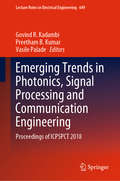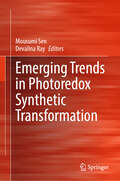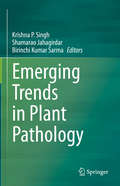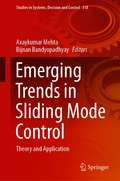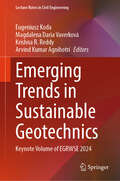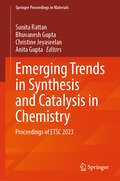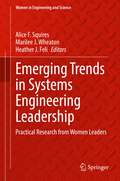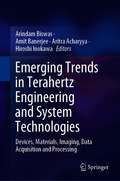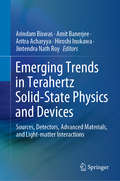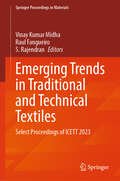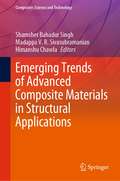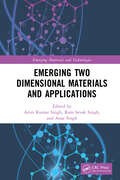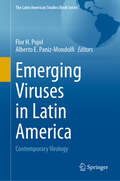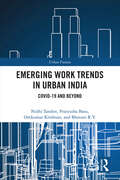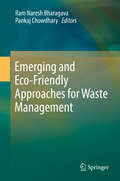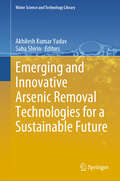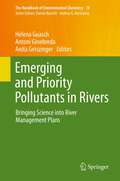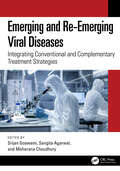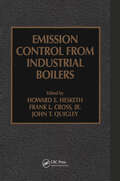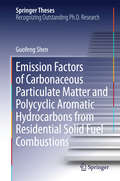- Table View
- List View
Emerging Trends in Photonics, Signal Processing and Communication Engineering: Proceedings of ICPSPCT 2018 (Lecture Notes in Electrical Engineering #649)
by Vasile Palade Govind R. Kadambi Preetham B. KumarThis volumes presents select papers presented during the International Conference on Photonics, Communication and Signal Processing Technologies held in Bangalore from July 18th to 20th, 2018. The research papers highlight analytical formulation, solution, simulation, algorithm development, experimental research, and experimental investigations in the broad domains of photonics, signal processing and communication technologies. This volume will be of interest to researchers working in the field.
Emerging Trends in Photoredox Synthetic Transformation
by Mousumi Sen Devalina RayThis book covers the basic concepts and applications of photoredox processes. This book highlights the applications of photoredox reactions in waste management, photoremediation, photodeposition, photocatalysis, sustainable therapeutic approaches, natural product synthesis and derivatization to photocatalytic degradation and beyond. The challenges associated with the application of synthetic transformations are the hazardous economic reaction conditions. It further discusses the application of these mechanisms in drug derivatization and degradation. The book also covers the topic of nano-photocatalyst for drug-free therapeutics. This book is useful for researchers and professionals in the various areas of applied chemistry and biotechnology and allied fields.
Emerging Trends in Plant Pathology
by Birinchi Kumar Sarma Krishna P. Singh Shamarao JahagirdarThis book offers a comprehensive guide to the identification, detection, characterization, classification and management of plant pathogens and other beneficial microbes in agriculture. The science of plant pathology is a dynamic field and, given the growing interest in sustainable agricultural practices, plant disease management has also gained importance. Further, there has been a shift from traditional chemical-based methods to eco-friendly integrated disease management strategies with a greater focus on bio-control and other eco-friendly technologies. This book provides a comprehensive and timely account of latest concepts and advances in the field of plant pathology, including detection and diagnosis, host resistance, disease forecasting and plant biotechnological approaches. Accordingly, it will be of great interest to academics and all stakeholders working in the fields of plant pathology, microbiology, biotechnology, plant breeding, and other life sciences.
Emerging Trends in Sliding Mode Control: Theory and Application (Studies in Systems, Decision and Control #318)
by Axaykumar Mehta Bijnan BandyopadhyayThis book compiles recent developments on sliding mode control theory and its applications. Each chapter presented in the book proposes new dimension in the sliding mode control theory such as higher order sliding mode control, event triggered sliding mode control, networked control, higher order discrete-time sliding mode control and sliding mode control for multi-agent systems. Special emphasis has been given to practical solutions to design involving new types of sliding mode control. This book is a reference guide for graduate students and researchers working in the domain for designing sliding mode controllers. The book is also useful to professional engineers working in the field to design robust controllers for various applications.
Emerging Trends in Sustainable Geotechnics: Keynote Volume of EGRWSE 2024 (Lecture Notes in Civil Engineering #584)
by Krishna R. Reddy Arvind Kumar Agnihotri Eugeniusz Koda Magdalena Daria VaverkováThis volume contains peer-reviewed and selected papers presented during the International Conference on Environmental Geotechnology, Recycled Waste Materials, and Sustainable Engineering 2024, held in Warsaw, Poland. It covers the recent innovations, trends, concerns, practical challenges encountered, and the solutions adopted in waste management and engineering, geotechnical and geoenvironmental engineering, infrastructure engineering, and sustainable engineering. This book will be useful for academics, educators, policymakers, and professionals working in the field of civil engineering, chemical engineering, environmental sciences, and public policy.
Emerging Trends in Synthesis and Catalysis in Chemistry: Proceedings of ETSC 2023 (Springer Proceedings in Materials #51)
by Anita Gupta Sunita Rattan Bhuvanesh Gupta Christine JeyaseelanThis book presents the select papers from the International Symposium on “Emerging Trends in Synthesis and Catalysis” (ETSC 2023). It covers the latest trends in novel synthesis strategies and highly efficient heterogeneous/homogeneous catalytic chemical species. Various topics covered in this book are green synthesis, reaction designs, catalyst synthesis, advanced materials for organic synthesis, polymer synthesis, stereoselective synthesis, flow chemistry, bio-catalysis, organo-catalysis, catalysis for sustainable development and industrial processes, multiphase catalysis, separation science and process development, organometallic compounds in synthesis and catalysis, computational tools for synthetic processes and processes for environment sustainability. The book is useful for researchers, academicians, and industrialists working in material science and industrial chemistry.
Emerging Trends in Systems Engineering Leadership: Practical Research from Women Leaders (Women in Engineering and Science)
by Marilee J. Wheaton Alice F. Squires Heather J. FeliThis book celebrates the efforts of women in the international systems engineering community. While there are dozens of books that tackle the topic of systems engineering and thousands of books that address leadership, this book is unique. Emerging Trends in Systems Engineering Leadership: Practical Research from Women Leaders presents personal, well-researched, hands-on perspectives of emerging trends in systems engineering leadership from industry, government, and academia, covering timely topics applicable across many domains – all under one cover. This book presents material for engineers, scientists, technologists, and others to help them tackle challenges in their everyday work dealing with complex socio-technical systems. The book provides guidance for leaders on shoring up essential (soft) skills to address the increasing demand for professional competencies; addresses diversity, equity, inclusion, and empowering women in the workforce; discusses broader facets of systems engineering leadership including systems thinking, ethics and utilitarianism; and investigates the impact of emerging technological change on systems resilience and the digital enterprise. This book provides a multi-perspective approach for leaders to navigate a changing world and develop and deliver optimal system solutions to global societal challenges that meet human needs. To this end, the authors extend beyond the solid technical base to encompass the human aspect of system behavior. This book is written by twenty-six female authors (three of whom also serve as the editors) from around the world at varying career stages who share their research, achievements, perspectives, and successes in emerging areas of systems engineering leadership.Testimonials:“As the systems that modern society depends on get more complicated and complex, we are in the midst of a renaissance with regard to research relating to systems engineering and science. A vast majority of this research is focused on the development of a modern toolkit for systems engineers today and into the future. This takes the form of new and improved methods, models, methodology, processes and tools. This research is critical but likely insufficient without a focus on the most valuable resource with regard to systems engineering within any organization – the human resource. Therein lies the focus of this textbook. It addresses systems engineering leadership from a variety of perspectives, while also addressing broad aspects relating to mentoring and the necessary evolving competencies that we need to address in today’s workforce. This emphasis makes this book unique. The icing on the cake is that all the chapters in this textbook are written by contemporary women leaders – this provides a necessary and unique perspective on the topic of leadership – that is long overdue! I highly recommend this textbook to all my colleagues in academia, industry, and government.”Dinesh Verma, Ph.D.Professor, Systems Engineering, School of Systems and EnterprisesExecutive Director, Systems Engineering Research Center (SERC)Stevens Institute of Technology, Hoboken, NJ 07030“The past decade has seen a dramatic increase in the number of women who are formally recognized in systems engineering technical, management and leadership positions in all sectors. With industry, academia, professional systems engineering societies and publishers enabling and illuminating the growing and substantial contributions of women in engineering, women have unprecedented opportunities today to contribute to systems engineering in both leadership and management positions. This volume, a compendium of chapters written by enterprising international women leaders at various stages in their career, addresses diverse topics such as leadership, management, empowerment, equity, diversity, inclusion, and mentoring. It is a valuable resource f
Emerging Trends in Terahertz Engineering and System Technologies: Devices, Materials, Imaging, Data Acquisition and Processing
by Amit Banerjee Arindam Biswas Aritra Acharyya Hiroshi InokawaThis book highlights emerging trends in terahertz engineering and system technologies, mainly, devices, advanced materials, and various applications in THz technology. It includes advanced topics such as terahertz biomedical imaging, pattern recognition and tomographic reconstruction for THz biomedical imaging by use of machine learning and artificial intelligence, THz imaging radars for autonomous vehicle applications, THZ imaging system for security and surveillance. It also discusses theoretical, experimental, established and validated empirical work on these topics and the intended audience is both academic and professional.
Emerging Trends in Terahertz Solid-State Physics and Devices: Sources, Detectors, Advanced Materials, and Light-matter Interactions
by Amit Banerjee Arindam Biswas Aritra Acharyya Hiroshi Inokawa Jintendra Nath RoyThis book highlights recent advances and applications in terahertz (THz) technology, addressing advanced topics such as THz biomedical imaging, pattern recognition and tomographic reconstruction for THz biomedical imaging by machine learning and artificial intelligence, THz imaging radars for autonomous vehicle applications, and THz imaging systems for security and surveillance. It also discusses theoretical, experimental, established and validated empirical work on these topics.
Emerging Trends in Traditional and Technical Textiles: Select Proceedings of ICETT 2023 (Springer Proceedings in Materials #55)
by Raul Fangueiro S. Rajendran Vinay Kumar MidhaThis book presents the select proceedings of the 3rd International Conference on Emerging Trends in Traditional and Technical Textiles (ICETT 2023) and examines the latest developments and applications in the field of textile materials, with a special focus on technical textiles. The topics covered include geotextiles, medical and healthcare textiles, protective textiles, thermal behavior of textiles, functional finishing of textiles, composites and green textiles. The book also discusses the dyeing, printing and fastness properties of the textile materials. This book is a valuable reference for researchers and professionals working in traditional textile design and technical textile applications.
Emerging Trends of Advanced Composite Materials in Structural Applications (Composites Science and Technology)
by Shamsher Bahadur Singh Madappa V. R. Sivasubramanian Himanshu ChawlaThis book introduces different advanced composite materials used in construction of civil engineering infrastructures. It reflects the latest manufacturing processes and applications in the civil structures. This book also includes test cases and its validation with finite element method using computer software. Moreover, the book also deals with design methodology of advanced composite materials based on different applications. The comprehensive overview of the state-of-the-art research on the composite materials presented herein is of interest to scientists, researchers, students and engineers, and practitioners in general working in area of innovative composite materials and structures. This book is also helpful for Ph.D. research scholars for developing their fundamental understanding on advanced materials, and it is also appropriate for master and undergraduate level courses on composite materials.
Emerging Two Dimensional Materials and Applications (Emerging Materials and Technologies)
by Arun Kumar Singh Ram Sevak Singh Anar SinghThis book details 2D nanomaterials, and their important applications—including recent developments and related scalable technologies crucial to addressing strong societal demands of energy, environmental protection, and worldwide health concerns—are systematically documented. It covers syntheses and structures of various 2D materials, electrical transport in graphene, and different properties in detail. Applications in important areas of energy harvesting, energy storage, environmental monitoring, and biosensing and health care are elaborated. Features: Facilitates good understanding of concepts of emerging 2D materials and its applications. Covers details of highly sensitive sensors using 2D materials for environmental monitoring. Outlines the role of 2D materials in improvement of energy harvesting and storage. Details application in biosensing and health care for the realization of next-generation biotechnologies for personalized health monitoring and so forth. Provides exclusive coverage of inorganic 2D MXenes compounds. This book is aimed at graduate students and researchers in materials science and engineering, nanoscience and nanotechnology, and electrical engineering.
Emerging Viruses in Latin America: Contemporary Virology (The Latin American Studies Book Series)
by Flor H. Pujol Alberto E. Paniz-MondolfiLatin America has extensive microbial diversity and is endemic for a wide array of infectious agents including dengue, chikungunya, malaria and tuberculosis. In 2014, the WHO cited 93 public health events of potential international concern in the Latin American region where over half (47 events) were caused specifically by chikungunya and other zoonotic pathogens, causing geographically widespread impact affecting 27 countries and territories. Arena, alpha and flaviviruses are RNA viruses, many of which are endemic in South America, are diverse in nature, and can adapt easily to new hosts, creating zoonotic threats. Since more than 70% of emerging diseases are caused by zoonotic agents, it is of great importance to enhance the capacity for detection and diagnosis in the areas where they are most likely to emerge. COVID-19 provided an opportunity to reinforce public health capacities, improve reporting transparency, and enhance regional coordination. Limited but consistent research has been carried out in the region to address the viral threats that account for a significant portion of health concerns. This book describes relevant examples of these achievements and discusses ongoing limitations in the region.
Emerging Work Trends in Urban India: COVID-19 and Beyond (Urban Futures)
by Nidhi Tandon Pratyusha Basu Omkumar Krishnan Bhavani R.V.This book offers an overview of India’s emerging digital economy and the resulting challenges and opportunities for urban workplaces. It examines contemporary economic and social transformations in India by focusing on how new technologies and policies are shaping urban work practices and patterns. The book emphasizes inclusive and equitable practices that consider the needs of the formal and informal sector workforce as essential to India’s urban development. Drawing on cross-disciplinary frameworks, it examines key issues related to work trends in the Indian urban economy and its digital landscapes, including Industry 4.0 and technology–labour nexus, smart cities and innovation, urbanism and consumerism, workplace transitions such as service industry and remote work, digital divide, skill development initiatives, and the impact of socio-economic inequalities and disruptions. The authors provide perspectives on the digital future of urban work in India and other emerging economies in the post-COVID-19 phase, and underscore the importance of enacting balanced policies, remodelling institutions, and equipping the labour force for adapting to new demands related to future employability and investments. This book will interest students, teachers, and researchers of urban studies, urban sociology, sociology of work, labour studies, human and urban geography, economic geography, urban economics, development studies, urban development and planning, public policy, regional planning, politics of urban development, social and cultural change, urban sustainability, environmental studies, management studies, South Asian Studies, and Global South studies. It will also be useful to policymakers, non-governmental organizations, activists, and those interested in India and the future of the global economy.
Emerging and Eco-Friendly Approaches for Waste Management
by Ram Naresh Bharagava Pankaj ChowdharyRapid industrialization is a serious concern in the context of a healthy environment. With the growth in the number of industries, the waste generated is also growing exponentially. The various chemical processes operating in the manufacturing industry generate a large number of by-products, which are largely harmful and toxic pollutants and are generally discharged into the natural water bodies. Once the pollutants enter the environment, they are taken up by different life forms, and because of bio-magnification, they affect the entire food chain and have severe adverse effects on all life forms, including on human health. Although, various physico-chemical and biological approaches are available for the removal of toxic pollutants, unfortunately these are often ineffective and traditional clean up practices are inefficient. Biological approaches utilizing microorganisms (bacterial/fungi/algae), green plants or their enzymes to degrade or detoxify environmental pollutants such as endocrine disruptors, toxic metals, pesticides, dyes, petroleum hydrocarbons and phenolic compounds, offer eco- friendly approaches. Such eco-friendly approaches are often more effective than traditional practices, and are safe for both industry workers as well as environment. This book provides a comprehensive overview of various toxic environmental pollutants from a variety natural and anthropogenic sources, their toxicological effects on the environment, humans, animals and plants as well as their biodegradation and bioremediation using emerging and eco-friendly approaches (e.g. Anammox technology, advanced oxidation processes, membrane bioreactors, membrane processes, GMOs), microbial degradation (e.g. bacteria, fungi, algae), phytoremediation, biotechnology and nanobiotechnology. Offering fundamental and advanced information on environmental problems, challenges and bioremediation approaches used for the remediation of contaminated sites, it is a valuable resource for students, scientists and researchers engaged in microbiology, biotechnology and environmental sciences.
Emerging and Epizootic Fungal Infections in Animals
by Seyedmojtaba Seyedmousavi G. Sybren de Hoog Jacques Guillot Paul E. VerweijThis book provides in-depth insights into epidemic and emerging mycoses in various animal groups. The different categories of pathogens and outbreak fungi are discussed. In an introductory chapter, the reader will be provided basic information on fungal infections that are non-transmissible, infections from a common environmental source known as sapronoses, and zoophilic fungal pathogens in various animal species and populations, worldwideChapter 2 details the vocabulary and terminology that is required in the scientific literature in order to maintain clarity of expression to the field of Mycology. Chapters 3 to 9 discuss epidemic mycoses with a reservoir in animals and occasional outbreaks, including dermatophytoses, coccidioidomycosis, histoplasmosis, paracoccidioidomycosis, adiaspiromycosis and similar diseases, blastomycosis, and paracoccidioidomycosis ceti (lacaziosis/lobomycosis). Chapters 10 to 15 comprise emerging mycoses in animals that include feline sporotrichosis, lethargic crab disease, emergence of C. gattii in animals and zoonotic potential, white-nose syndrome in hibernating bats, chytridiomycosis in frogs and salamanders and aspergillosis in cats. The last chapter is about treatment possibilities, antifungal use in veterinary practice, and emergence of resistance. The book will address medical and veterinary mycologists, microbiologists, veterinarians, infectious disease specialists, epidemiologists, ecologists, public health scientists from academia and industry as well as graduate students, PhD students and postdocs in the field.
Emerging and Innovative Arsenic Removal Technologies for a Sustainable Future (Water Science and Technology Library #131)
by Akhilesh Kumar Yadav Saba ShirinThis book presents an overview of the techniques available today to remove arsenic contamination, pollutants, and species from water. Traditionally applied techniques for removal of arsenic pollutants/species, including oxidation, coagulation-flocculation, and membrane techniques. Furthermore, recent progress has been made on the utility of various nanoparticles for the extraction of contaminated water. Arsenic contamination affects the quality of water resources worldwide as a result of human activities (pesticides and other uses). Due to the insufficiency of water treatment facilities in developing countries, oral exposure to chemical toxicants through drinking water is a health threat. Arsenic is a mobile element with a crustal abundance of 1.8 mg kg-1 and can travel in different components of the environment, including air, soil, and water before entering into its ultimate sink, that is, bottom sediments and sea. Arsenic may enter groundwater from both geogenic and anthropogenic sources and primarily exists in inorganic form as oxy-anions. Groundwater is relatively more vulnerable to arsenic contamination from geothermal inputs, including the weathering and dissolution of arsenic-bearing rocks and minerals. Arsenic mobility is enhanced in subsurface anoxic conditions, making groundwater more vulnerable to arsenic contamination. Ingestion of groundwater-laden arsenic may cause carcinogenic and non-carcinogenic health ailments. Chronic oral exposure ≤ 50 µg L-1 of arsenic can cause skin lesions, skin cancer, melanosis, hyperkeratosis, hypertension, gangrene, cardiovascular problems, black foot disease, neuropathy, peripheral vascular disease, restrictive lung disease, bladder cancer, lung cancer etc. Hence, specific water treatment processes are required to meet anticipated more severe water quality standards. A better understanding of currently available processes is necessary to develop economical, efficient and effective methods for arsenic removal. Arsenic can be coated, adsorbed using a wide range of mineral and organic or can be directly rejected by membrane processes such as reverse osmosis and nanofiltration. The recent development of submerged hybrid membrane systems, such as membrane bioreactors in wastewater treatment, provides alternative technologies for arsenic treatment.
Emerging and Priority Pollutants in Rivers
by Helena Guasch Antoni Ginebreda Anita GeiszingerThe enduring changes in the aquatic environment and the increasing influx of contaminants call for novel conceptual and methodological approaches to relating chemical pollution and ecological alterations in ecosystems. This volume highlights the latest advances concerning the sampling, analyses, occurrence, bioavailability, and effects of emerging and priority pollutants in European rivers, the current status of the River Management Plans in Europe, and the applicability of the newly developed techniques for water monitoring purposes. The topics are discussed in the context of the EU Water Framework Directive, evaluating their shortcomings and providing a basis for doing away with them. Linking scientific research and river management practices, this book is an invaluable source of information for environmental chemists, aquatic scientists, ecologists and water managers.
Emerging and Re-Emerging Viral Diseases: Integrating Conventional and Complementary Treatment Strategies
by Srijan Goswami Moharana Choudhury Sangita AgarwalThis reference book offers an in-depth analysis of the fundamental aspects, causative agents, and clinical manifestations of emerging and re-emerging infectious diseases of viral origin (EID-REID). It elucidates the role of evolutionary processes in the emergence, adaptation, and dissemination of pathogens. The initial chapter explores the causative agents behind EID-REID, providing a comprehensive overview of their origins, characteristics, and modes of transmission. The book further presents the structure, pathophysiology, and clinical presentation of various viral pathogens, including notable viruses such as the Crimean-Congo hemorrhagic fever Orthonairovirus (CCHFV), Rift Valley fever virus, Lassa virus, Nipah virus (NiV), Filoviridae, and coronaviruses (MERS, SARS, SARS-CoV-2). Additionally, the book elucidates the multifaceted landscape of treatment strategies, highlighting the pivotal role of pharmacological strategies, investigational drugs, vaccines, and immunomodulatory approaches. It also underscores the importance of clinical examination, immunoassays, and molecular diagnostic techniques for the early detection and accurate diagnosis of viral EID-REID. Toward the end, the book sheds light on the pivotal role of the Ayurveda, homoeopathic system of medicine, medical nutrition therapy, computational biology, bioinformatics, and systems biology in advancing disease management paradigms. This book is intended for epidemiologists, virologists, infectious disease specialists, and other healthcare practitioners who seek in-depth knowledge about emerging and re-emerging infectious diseases.
Emil Fischer’s ‘’From My Life’’: English Translation of ‘’Aus Meinem Leben’’ (Springer Biographies)
by David M. Behrman Edward J. BehrmanThis book is a translation of Emil Fischer’s autobiography published in 1922 by Verlag von Julius Springer, Berlin, Germany. It is the first translation of this work into English, guiding the reader through the life of a man who was one of the greatest chemists of all time. Emil Fischer published very important papers on sugars, purines, and peptides. His proof of the stereo chemistry of glucose remains one of the great intellectual and practical achievements of science. The book is of great benefit to the current and future generations of chemists, giving them the chance to get to know Emil Fischer's life story.
Emil du Bois-Reymond: Neuroscience, Self, and Society in Nineteenth-Century Germany (Transformations: Studies in the History of Science and Technology)
by Gabriel FinkelsteinA biography of an important but largely forgotten nineteenth-century scientist whose work helped lay the foundation of modern neuroscience.Emil du Bois-Reymond is the most important forgotten intellectual of the nineteenth century. In his own time (1818–1896) du Bois-Reymond grew famous in his native Germany and beyond for his groundbreaking research in neuroscience and his provocative addresses on politics and culture. This biography by Gabriel Finkelstein draws on personal papers, published writings, and contemporary responses to tell the story of a major scientific figure. Du Bois-Reymond's discovery of the electrical transmission of nerve signals, his innovations in laboratory instrumentation, and his reductionist methodology all helped lay the foundations of modern neuroscience.In addition to describing the pioneering experiments that earned du Bois-Reymond a seat in the Prussian Academy of Sciences and a professorship at the University of Berlin, Finkelstein recounts du Bois-Reymond's family origins, private life, public service, and lasting influence. Du Bois-Reymond's public lectures made him a celebrity. In talks that touched on science, philosophy, history, and literature, he introduced Darwin to German students (triggering two days of debate in the Prussian parliament); asked, on the eve of the Franco-Prussian War, whether France had forfeited its right to exist; and proclaimed the mystery of consciousness, heralding the age of doubt. The first modern biography of du Bois-Reymond in any language, this book recovers an important chapter in the history of science, the history of ideas, and the history of Germany.
Emilie du Châtelet between Leibniz and Newton
by Ruth HagengruberEmilie du Châtelet was one of the most influential woman philosophers of the Enlightenment. Her writings on natural philosophy, physics, and mechanics had a decisive impact on important scientific debates of the 18th century. Particularly, she took an innovative and outstanding position in the controversy between Newton and Leibniz, one of the fundamental scientific discourses of that time. The contributions in this volume focus on this "Leibnitian turn". They analyze the nature and motivation of Emilie du Châtelet's synthesis of Newtonian and Leibnitian philosophy. Apart from the Institutions Physiques they deal with Emilie du Châtelet's annotated translation of Isaac Newton's Principia. The chapters presented here collectively demonstrate that her work was an essential contribution to the mediation between empiricist and rationalist positions in the history of science.
Emission Control from Industrial Boilers
by John T. Quigley Frank L. Cross Jr. Howard D. HeskethFrom the PrefaceThe Clean Air Act Amendments (CAAA) of 1990 significantly affect commercial and industrial combustion devices such as boilers, incinerators, and other burners. Under the new emission regulations already promulgated and those being developed, compliance will require improved equipment, more detailed operator training, new permits
Emission Factors of Carbonaceous Particulate Matter and Polycyclic Aromatic Hydrocarbons from Residential Solid Fuel Combustions
by Guofeng ShenEmission inventory is basic for the understanding of environmental behaviors and potential effects of compounds, however, current inventories are often associated with relatively high uncertainties. One important reason is the lack of emission factors (EFs), especially for the residential solid fuel combustion in developing countries. In the present study, emission factors of a group of pollutants including particulate matter, organic carbon, elemental carbon (sometimes known as black carbon) and polycyclic aromatic hydrocarbons were measured for a variety of residential solid fuels including coal, crop straw, wood, and biomass pellets in rural China. The study provided a large number of emission factors that can be further used in emission estimation. Composition profiles and isomer ratios were investigated and compared so as to be used in source apportionment. In addition, the present study identified and quantified the influence of factors like fuel moisture, volatile matter on emission performance. The publication of the study will be of interest and helpful to the readers in the field of air pollution, human health, fuel saving and energy consumption etc. Guofeng Shen works at the Institute of Atmospheric Sciences, Jiangsu Academy of Environmental Sciences, China.
Emma Darwin: The Wife of an Inspirational Genius
by Edna HealeyMuch has been written about Charles Darwin but this is the first biography of his strong, intelligent wife. Emma Wedgwood, granddaughter of the famous Josiah, married Charles Darwin in 1839, three years after he returned from his extraordinary voyage on the Beagle. Their life together was intellectually exciting though overshadowed by personal tragedy. Edna Healey has discovered new, and hitherto unpublished, material and has had the full support of the Darwin family in writing this major biography.
